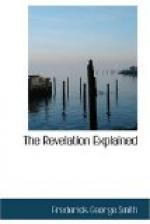The blasphemy of opposing, self-styled Jews is next mentioned. In all probability the term Jew is applied in its spiritual sense. Paul declares that “he is not a Jew which is one outwardly ... but he is a Jew which is one inwardly” (Rom. 2:28, 29), and that “if ye be Christ’s, then are ye Abraham’s seed, and heirs according to the promise.” Gal. 3:29. These persons professed to belong to the true “Israel of God” (Gal. 6:16), but they were without salvation; and the Smyrnaen church would not recognize them as belonging to the congregation, and therefore the only name that could be applied to them was “the synagogue of Satan.” Had they been tolerated in the assembly of the righteous, Christ would have condemned or rebuked the church for not performing their duty, the same as he did the churches of Pergamos and Thyatira.
Great persecutions for the church of Smyrna are predicted; but he “which was dead, and is alive forevermore,” having passed through the ordeal of suffering and death himself, stands in a position to speak words of comfort and consolation, assuring them in the strongest terms that, although wicked men and the devil may cast them into prison and persecute them unto the death, yet “he that overcometh shall not be hurt of the second death.” The overcomers are of the number of those who, having had “part in the first resurrection, on such the second death hath no power.” Chap. 20:6. The ten days doubtless are prophetic time (which will be explained later) and signify ten years, which was probably fulfilled in the terrible persecution that began under the reign of Diocletian, and continued ten years, or from A.D. 302 to 312.
The subsequent history of Smyrna has been different from that of Ephesus, in that it has retained its name and importance until the present day, being the greatest commercial city in the Levant. It has a population of more than two hundred thousand, several thousand of whom belong to the Greek and Armenian churches. The light there has become dimmed, but let us pray that God will soon remember the faith and perseverance of his ancient servants and again trim the lamps that once shone so brightly.
12. And to the angel
of the church in Pergamos write; These
things saith he which hath
the sharp sword with two edges;
13. I know thy works, and where thou dwellest, even where Satan’s seat is: and thou holdest fast my name, and hast not denied my faith, even in those days wherein Antipas was my faithful martyr, who was slain among you, where Satan dwelleth.
14. But I have a few things against thee, because thou hast there them that hold the doctrine of Balaam, who taught Balac to cast a stumbling-block before the children of Israel, to eat things sacrificed unto idols, and to commit fornication.
15. So hast thou also
them that hold the doctrine of the
Nicolaitanes, which thing
I hate.




